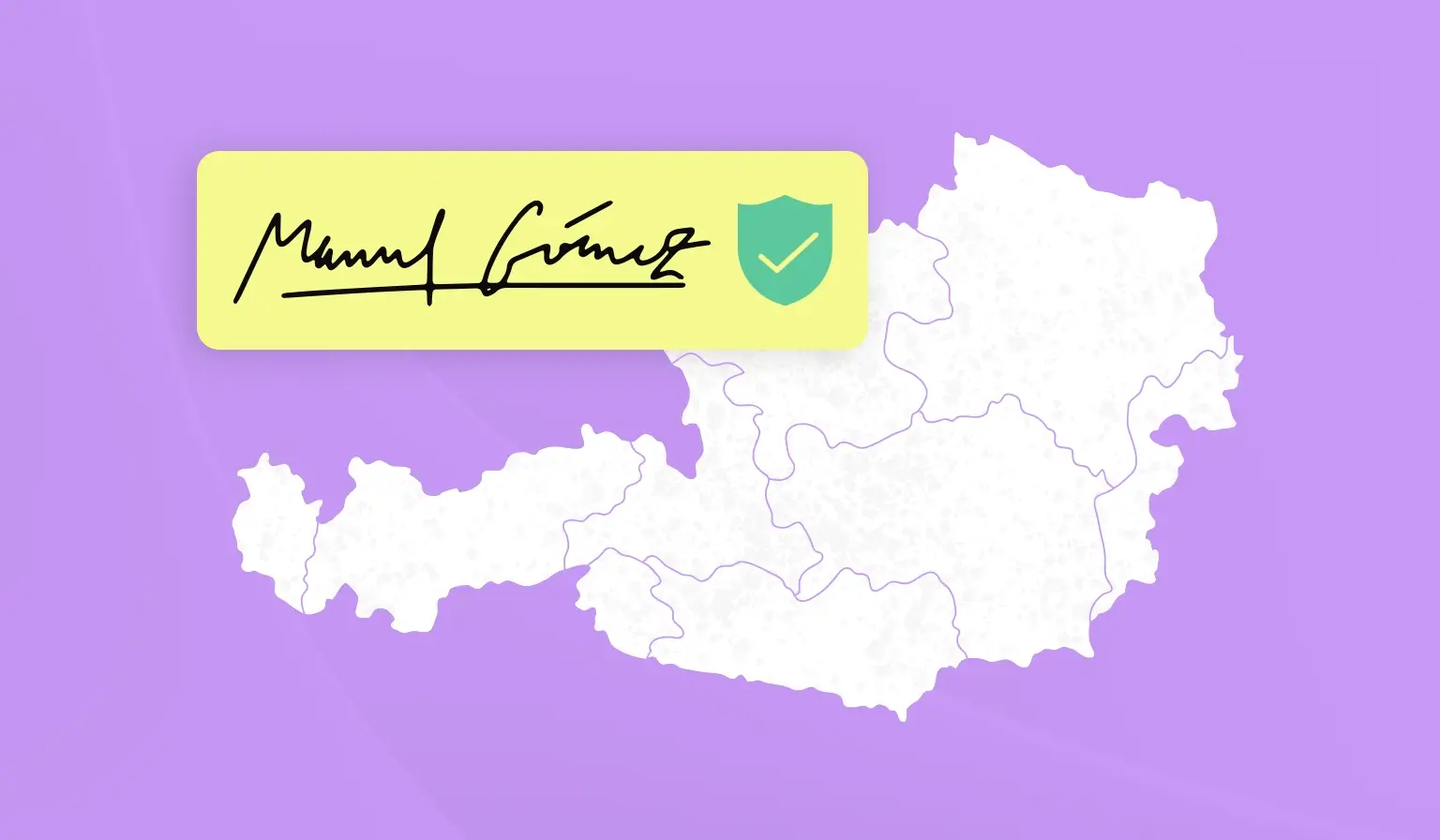Are eSignatures Legal in Austria?

As a member state of the European Union, Austria recognizes electronic signatures as legally valid. However, depending on the type of document you're signing, you might need to keep some special considerations in mind. Here's what you need to know before you start signing documents electronically in Austria.
Three types of eSignatures in Austria
As most EU member states, Austria recognizes three types of electronic signatures. These are:
-
Simple electronic signature (SES), which is the most basic and the least verifiable ones. Think checkboxes that you click on to agree to the terms of using a website and scanned signatures.
-
Advanced electronic signature (AES) that comes with security features such as encryption and signer authentication. They can be uniquely linked to the signer, identify them, and also control any changes to documents.
-
Qualified electronic signature (QES), which carries the highest level of legal validity. The requirements are the same as for advanced electronic signatures, except for the fact that qualified electronic signatures require a qualified certificate and a qualified device.
What this means in practical terms
Under Austrian law (General Civil Code, Section 883), contracts are generally considered valid if two competent parties reach an agreement. This agreement can be reached verbally, electronically, or using a physical paper document.
Put simply, a written signature is not necessarily required for the contract to be valid. That said, if the matter comes to court, you'll have to present evidence to prove your contract's validity.
Like other EU member states, Austria has adopted the eIDAS regulation. While eIDAS defines three types of electronic signatures across the EU, it also lets national law to set requirements on the types of signatures required in different circumstances.
When you'll need a qualified electronic signature in Austria
A qualified electronic signature (QES) has the same legal effect as a handwritten signature. Its authenticity is presumed unless proven otherwise and it's accepted as evidence in legal proceedings. That said, you'll rarely need it in Austria.
As in other EU member states, acquiring a qualified electronic signature certificate involves a qualified trust service provider (QTSP) and a qualified device, such as a biometric ID card. The procedure is not all that straightforward and usually involves additional electronic devices that a regular household doesn't have on hand.
Because of this, an advanced electronic signature is usually more than enough, except in cases in which the law explicitly calls for a qualified electronic signature. In Austria, you have to use qualified electronic signatures in order to sign:
-
Employment agreements with apprentices
-
Agreements on employee invention ownership
-
Personal declarations of guarantee
For everything else, there's the advanced electronic signature
Well, almost everything, except for the few cases when a traditional, handwritten signature is required (covered below). While an advanced electronic signature is not specifically required for all of the following, we highly recommend using one anyway.
Unlike a simple (standard) electronic signature, an advanced one comes with security features that you'll want to have if a deal goes sour. For example, let's say your client signed a contract by pasting an image of their scanned signature into a document. If the matter comes to court, they could claim their assistant or someone else in the office pasted their signature in without their consent.
On the other hand, with advanced electronic signatures, you can rely on electronic identification to prove the agreement was signed by the person stated in the contract. Thanks to IP address tracking, timestamps, and other electronic data, an advanced electronic signature is uniquely linked to the signer, so there's no room for foul play.

So, if you're working with electronic documents, your best bet is to use a digital signature software compliant with both EU and US regulation. In Austria, you can use software like Better Proposals to sign:
HR documents, such as
-
Employment contracts (except with apprentices)
-
Non-disclosure agreements
-
Privacy notices
-
Benefits paperwork
-
New employee onboarding documents
Commercial agreements, such as
-
Non-disclosure agreements
-
Invoices
-
Purchase orders
-
Procurement documents
-
Sales agreements
-
Distribution agreements
-
Service agreements
Consumer agreements, such as
-
Sales terms
-
Services terms
-
Software licenses
-
Purchase orders
-
Order confirmations
-
Shipment documentation
-
Invoices
-
Policies
-
User manuals
Other agreements, such as
-
Residential lease agreements
-
Commercial lease agreements
-
Service agreements
-
Copyright, trademark, and patent licenses
-
Patent and copyright assignments (except employee inventions)
What about handwritten signatures?
While most transactions in Austria can be in electronic form, there are a few instances when a traditional, handwritten signature is required. These are:
-
Legal transactions under family and inheritance law
-
Provisions in a lease agreement that are not in the interest of the tenant
-
Legal transactions entered into by blind persons
-
Non-revocable employee consent to the use of surveillance systems
-
Employee contract amendments (parental leave, study leave, leave of absence reduction of work hours)
-
Any other documents requiring formal notarization
Secure your electronic transactions with Better Proposals
When it comes to electronic contracts and other business documents you want to get signed electronically, using specialized software is always your best bet. Better Proposals is compliant with both US and EU eSignature regulation and our eSignatures make sure your official documents are legally valid.
Instead of relying on scanned signatures that are easy to tamper with, choose software that protects both you and your clients. The first 14 days are on us.



